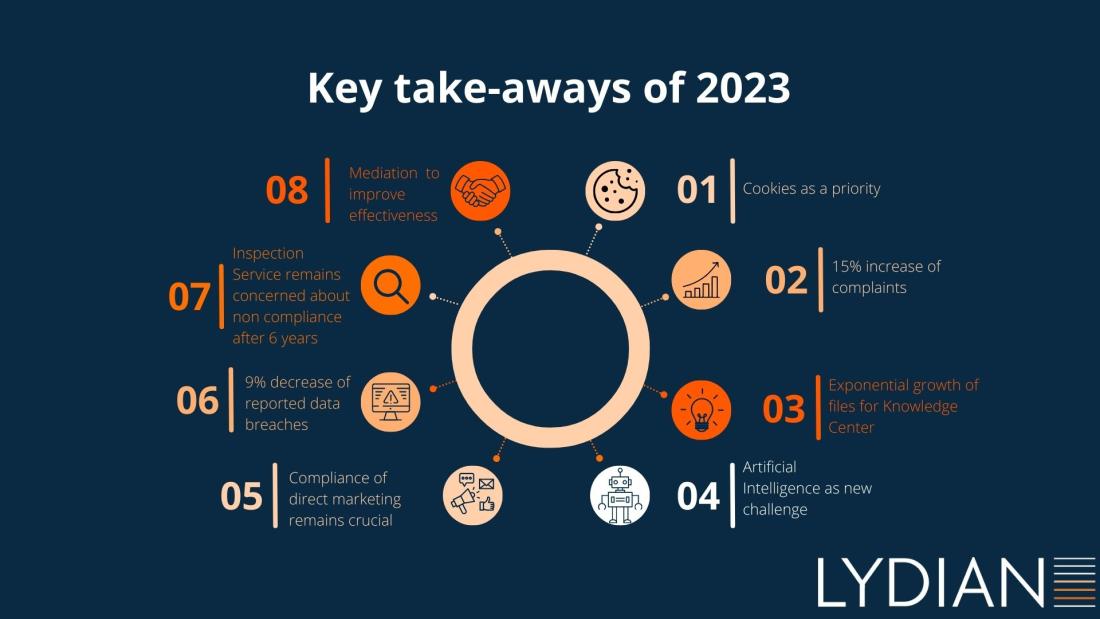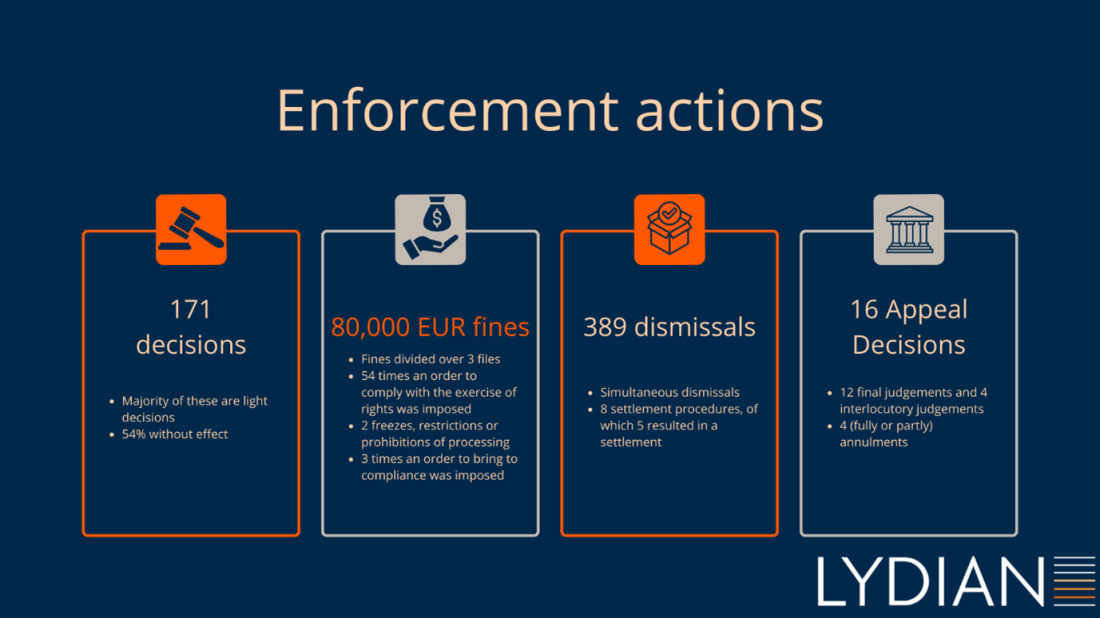
Liese Kuyken
Commercial law
Dispute Resolution
Information Communication Technology
Information Governance & Data Protection
Intellectual Property (IP)
Telecommunications, Media & Technology
liese.kuyken@lydian.be
Over the past few years, the Belgian Data Protection Authority (the DPA) has emerged as a remarkably active regulator, both in its advisory and supervisory function. To provide an overview of its activities, the DPA recently published its Annual Report 2023 (the Annual Report). [1]

With a significant increase in the number of complaints and legislative opinions to be handled by the Knowledge Center, the expansion of the DPA's staff was long awaited. According to the DPA, this recruitment will enable the DPA to fulfil its core tasks in 2024: to supervise, but also to support citizens, data controllers and public authorities in implementing privacy and personal data protection rules. The DPA is performing this mission in an increasingly complex context, with the development of issues related to artificial intelligence and a new European legal framework for the digital space in addition to the GDPR.
Change also came at the highest level within the regulator in 2023. The five-member Executive Committee of the DPA has been complete again since 26 June 2023, with the appointment of Anne-Charlotte Recker, Director of the First Line Service, and Koen Gorissen, Director of the General Secretariat.
The DPA actively contributed to the work of the European Data Protection Board (EDPB). Moreover, the Annual Report describes the main conferences where the DPA was represented, which allows the DPA to share its knowledge, learn, meet its European colleagues and exchange best practices with them.
Because of increased public worry and data controllers' need for help to follow cookie rules, the DPA made cookies (and other trackers) a key focus in 2023. The DPA therefore set about creating tools to raise awareness about the use of cookies and, through the EDPB, helped to harmonise positions on cookies at the European level:
The DPA considers the role of the DPO to be particularly important, as they are seen as a protector of citizens' personal data on the ground. In 2023, the DPA started a conversation with actors in the field to understand their challenges and offer practical solutions. Meanwhile, the Inspection Service and the Litigation Chamber kept conducting their investigations to support the independence of the DPO and the sufficient provision of resources, such as the time the DPO can spend on data protection matters and training needs.
The DPA's priority regarding the DPO was also demonstrated by the organisation of the DPO Day and the adoption of several decisions by the Litigation Chamber about the role and the position of the DPO. The DPA also stated that the DPO will remain a significant issue in the future years.
In 2023, the DPA still raised awareness among its audiences, especially with the main information product "I decide", which teaches children and young people about privacy. Also, the First Line Service educated the public with legal and technical information, such as thematic sheets and FAQ, for both data subjects and data controllers.
The DPA has been following the advances in artificial intelligence technologies closely. It recognizes the possibilities, but it will also be careful to make sure that the principles of the GDPR are respected. The DPA thinks that particular care should be given to the higher risk of data processing with changing, self-learning parameters, called "machine learning", which has already received a lot of criticism from the Court of Justice of the European Union (CJEU).
The DPA has participated in this matter by giving opinions on draft laws and by advising the Chamber of Representatives on the "ethical and societal aspects of artificial intelligence". The DPA is also looking into complaints about chatbots.
At a time when international transfers are a contentious issue, the General Secretariat's role in adopting binding corporate rules is crucial. Out of 8 files submitted, 4 were approved in 2023. In addition, the DPA worked with the EDPB to publish the final version of Recommendations 1/2022 on the Approval Application and on the elements and principles to be included in Controller Binding Corporate Rules (Art. 47 GDPR).
If a DPIA shows that processing would be high-risk without risk-reducing measures, the controller must ask the supervisory authority before processing. The Act establishing the DPA says in Art. 20 §1, 3° that the General Secretariat should give this advice. But data controllers rarely do this. So, in 2023, they only sent two matters, and the General Secretariat gave one opinion and rejected one matter.
Ransomware attacks hit many Belgian cities and municipalities in 2023. The DPA's ninth newsletter had a regular section called "Recommendations to prevent data breaches" that focused on this kind of data breach.
The DPA gave some useful advice in its tenth newsletter. It covered the issue of online testing environments that are not secure enough; and the handling of personal data in a paper file or to be put in one.
The EDPB published the definitive version of the updated Data Breach Notification Guidelines on 4 April 2023, after a public consultation in October 2022. The DPA was a co-reporter for these Guidelines.
The number of data breach notifications decreased slightly in 2023. There were 1,292 reports, of which 43% were related to human error and 32% to hacking, phishing or malware.
The General Secretariat dealt with 1,080 cases of data breaches in 2023. Most of these were resolved without finding any major breaches, sometimes after getting more information from the controller. In three cases, where the General Secretariat itself acted on its own accord, the Executive Committee was asked to refer them to the Inspection Service, as they involved possible data breaches that were not reported.
The First Line Service receives incoming complaints and mediation requests and examines their admissibility. To improve the effectiveness of procedures, since the last quarter of 2023, the service has been working to better support citizens who have filed a complaint by proposing, after analysis, mediation in the files that lend themselves to it. If the dispute is not resolved satisfactorily at the end of the mediation, dispute proceedings are initiated.
A total of 214 mediation files were overseen in 2023. The areas in which most mediation files were initiated are:
The result for 2023 is 132 completed mediation files, of which just under half (59) resulted in a successful outcome. However, only a minority (28) of the files were converted into a complaint and forwarded to the Litigation Chamber.
A total of 694 complaints were received by the First Line Service. Out of these, 254 (36.5%) turned out to be inadmissible. The areas to which most complaints relate are:
Like the increase in the number of mediation requests received, the number of complaints submitted to the DPA is on the rise (up 15% by 2023).
In 2023, the Knowledge Center had to deal with a rapid increase of files, leading to 611 requests for guidance. In 2023, it issued 546 opinions (including 131 in-depth opinions and 415 standard opinions) on draft laws and regulations. The Knowledge Center focused on legislative opinions, especially on topics that affect the everyday lives of citizens, as it expected to have more opportunities for recommendations from its own initiative. Some examples are a draft decree of the Walloon Government on the pricing method for smart meters, the pupil support package in the Walloon-Brussels Community, and a decree changing the organisation of education in the Flemish Region.
Based on the Act that created the DPA, the Inspection Service has many ways to investigate. The Belgian Whistleblower Act adds to these powers. The Inspection Service can investigate external reports under the whistleblower rule if they are sent directly or through the Federal Ombudsman, following a set protocol between them and the DPA. The Inspection Service also has a Charter that gets updated regularly based on new practices and insights.
The Inspection Service observes that cases become more complicated, not only in terms of content, but also in terms of procedure. The Inspection Service has received occasional feedback that the number of questions asked does not always appear to be proportionate to the file or that the questions are very general. However, the goal of the Inspection Service is not only to examine a file against the controller, but also to raise awareness. In this way, the controller is encouraged to think carefully about various aspects of its processing operations and can evaluate more accurately whether its processing operation(s) comply/complies with the GDPR or not and, if necessary, make changes.
However, the Inspection Service sees that, even though the GDPR has been applicable since 25 May 2018 (and even in force since 2016), there is still a lot of work to be done by businesses. A data controller can no longer be unaware. On the positive side, when the Inspection Service detects that the controller cooperates immediately and wants to adopt a constructive attitude by acting in a solution-oriented manner and considering the Inspection Service's remarks, the Inspection Service often closes concrete files. The concrete results achieved after the intervention of the Inspection Service lead directly to better GDPR compliance.
The Litigation Chamber sent 70 new files to the Inspection Service, with some common groups of investigation topics:

There is no equivalent of the Litigation Chamber among either market regulators in Belgium or other privacy regulators in the EU. The Litigation Chamber has a distinctive structure. It is a supervisory body, but it operates in a quasi-judicial manner. It makes decisions based on submissions from parties and sometimes after a hearing.
The DPA was busy with enforcement in 2023. It gave out 171 decisions that year. Most of them were "light decisions" and the Litigation Chamber chose to dismiss (81 files), warn (30 files), or order compliance with rights requests (51 files). There were few decisions on the merits, which led to 12 dismissals, 17 warnings and reprimands, 3 orders for compliance with rights requests, 2 processing freezes, restrictions or bans, and 3 orders to fix the processing. The DPA also fined 3 files a total of EUR 80,000 in 2023.
The Litigation Chamber further developed the tool of settlement in 2023 (by publishing a general settlement policy) and applied it to 8 specific cases, resulting in a successful settlement in 5 cases. To deal with the backlog, the Litigation Chamber decided in spring 2023 to simultaneously close 389 cases.
In 2023, 18 new appeals were lodged (with the Market Court) against decisions of the Litigation Chamber. The idea that the Market Court would function as a "sanction reducer", at least in 2023, is untrue. In 2023, the Market Court ruled on 16 appeals, in which 12 final decisions and 4 interim decisions were issued and in which only 4 decisions were overturned – wholly or partially.
The detailed report covers the operations of each of the supervisor's departments and describes its key priorities.

Commercial law
Dispute Resolution
Information Communication Technology
Information Governance & Data Protection
Intellectual Property (IP)
Telecommunications, Media & Technology
liese.kuyken@lydian.be